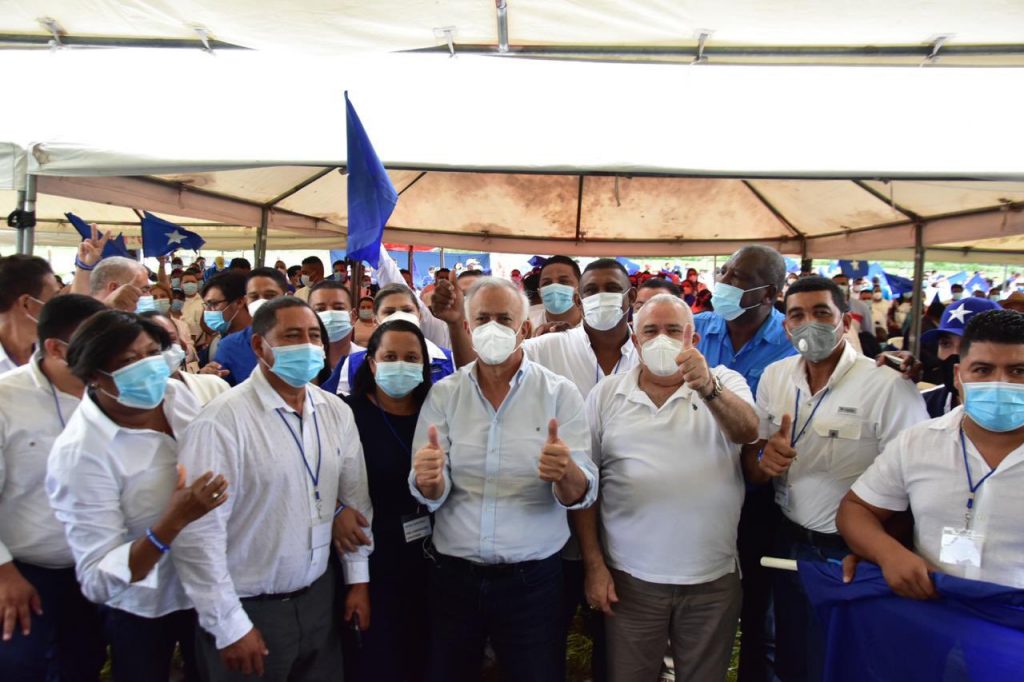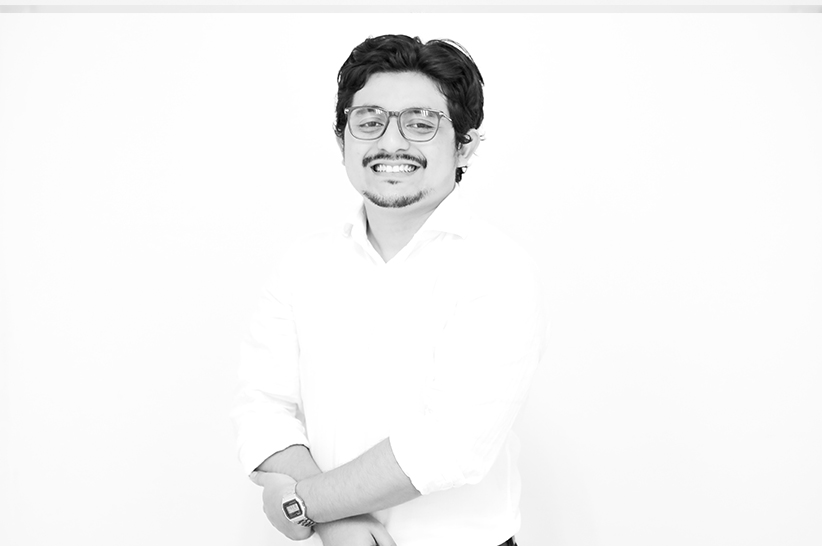Last Monday, the government’s special anti-corruption unit (Unidad Fiscal Especializada Contra Redes de Corrupción – UFERCO) presented its court case against Nasry Asfura, a candidate for the National Party’s presidential nomination, and a member of its Let’s Save Honduras movement (Salvemos Honduras del Partido Nacional). The charges accuse him of using public funds for his 2014 political campaign. Meanwhile, the National Congress continues to debate electoral reforms.
By Fernando Silva
File photos by Deiby Yánes and Twitter quotes from Mauricio Oliva
On October 26, the government’s special anti-corruption unit (Unidad Fiscal Especializada Contra Redes de Corrupción – UFERCO) presented its pre-trial case before the Anti-Corruption Criminal Court against two Central District municipal officials: Nasry Asfura, the current mayor and candidate for the National Party’s presidential nomination, and councillor Nilvia Castillo. They are accused of laundering assets to the detriment of the state, fraud, embezzlement of public funds, falsifying documents, and misuse of public office.
Documents pertaining to the investigation have been disseminated through social networks, and are now being analyzed by the Center for Democratic Studies (Centro de Estudio para la Democracia – CESPAD). These documents charge that to finance his campaign, Nasry Asfura opened an account in Banco Ficohsa under the name Political Campaign Contributions, and deposited 13 checks amounting to approximately 11.9 million lempiras ($477,000). These funds were allegedly siphoned off a trust account where all municipal revenue was deposited.
The pre-trial case was presented to the court after the National Congress approved reforms last week to the nation’s political campaign financing law (Ley de Financiamiento, Transparencia y Fiscalización a Partidos Políticos). The main thrust of these reforms was to establish measures for auditing new political movements, the campaigns of pre-candidates (candidates for their party’s nomination), and other aspects of primary election financing. The auditing would be conducted by UFTF, the government agency overseeing the financing, transparency, and control of political parties (Unidad de Financiamiento, Transparencia y Fiscalización de Partidos Políticos – UFTF). However, some civil society organizations contend that these reforms don’t go far enough. To ensure reliable and equitable elections, they point to the need for additional reforms to the new Electoral Law that is currently being debated in Congress.
Political party financing
Reforms were made to ten articles in the nation’s “clean politics” law (Ley de Política Limpia), and include a provision prohibiting disbursements of campaign funds more than 50 days before the primary elections. Another provision requires resources from public and private campaign financing to be deposited in separate accounts according to the type of financing. This provision also applies to each political party’s internal accounts.
Regarding purchases of television advertising, Article 28 states that, “per the principle of equal time in political advertising on television, the media cannot discriminate against any political party, candidate, alliance of political parties, independent candidate, internal movement, nascent political movement, or pre-candidate. To comply with limits on electoral campaign expenditures, all purchases of any type of media advertising must be reported.”
The main objective of these reforms is to expand the UFTF’s scope of control beyond the financing of general election campaigns to encompass primary election campaign financing as well.
In this regard, Rafael Jerez, legal officer for the Association for a Fairer Society (Asociación para una Sociedad más Justa – ASJ), and a member of the Voto Informado (Informed Vote) initiative, posted the following tweet:
“If the UFTF doesn’t have resources, it can’t really conduct any audits that go beyond a superficial document review. It can’t travel to the country’s various departments to see how the parties spent the money and where that money came from.”
The as-yet unapproved 2021 General Budget has a budget for the national elections council (Consejo Nacional Electoral – CNE) of 1.8 billion lempiras ($73.6 million) to fund elections and other operational expenses. Only 30 million lempiras ($1.2 million) will be allocated to the UFTF – less than 2% of the CNE budget.
In a recent statement, Voto Informado noted that the UFTF does not have the budget, human and technical resources, ability to penetrate bank secrecy, and other tools needed to fulfill the obligations mandated by these reforms. As an example, the statement cited the report on its oversight of the 2017 general elections, which wasn’t officially delivered until October 1 of this year. Giving the UFTF the responsibility of overseeing the March 2021 primaries without strengthening its capabilities would mean that a report on the primary process probably wouldn’t be delivered until 2024. “Giving the UFTF more electoral oversight could be a strategy to overload it with work, while denying it the means for developing an objective oversight and sanctioning capability,” said the Voto Informado statement.
The Clean Politics Unit was created in 2016 by an initiative supported by the Organization of American States’ (OAS) mission to fight corruption and impunity in Honduras (Misión de Apoyo contra la Corrupción y la Impunidad en Honduras – MACCIH). Its objective was to fight corruption and the illegal financing of electoral campaigns, and its approval was closely linked to the allegations of embezzlement committed by the Honduran Social Security Institute (IHSS). Money was diverted from the IHSS into National Party accounts to finance its 2014 presidential campaign. The National Party admitted its guilt in this case and President Juan Orlando Hernandez promised to return the money.
The law that ultimately mandated the creation of the UFTF required that it be financed from the CNE budget. In his report, The Cost of Democracy in Honduras, Ismael Zepeda of the Social Forum on Foreign Debt and Development (Foro Social de la Deuda Externa y Desarrollo – FOSDEH) commented to news media that “the [UFTF] is allocated the same budget every year even though everyone knows that it’s not enough money for it to conduct all the necessary audits and oversight.”
Because of the pandemic, the offices of the Clean Politics Unit are almost always understaffed. When we asked to speak with one of the three commissioners leading this unit, a police officer seemed to be unsure as to when a commissioner could come and attend to the news media. Meanwhile, the pre-candidates from the 10 internal factions of the National, Liberal and Free Parties that will compete in the March 2021 primary elections are holding political rallies every weekend, usually without enforcing biosafety measures.
Even though there was never anyone in the UFTF offices, they issued a statement in early July that extended the deadline for each political organization to present its legally required annual financial statements (Informe Anual del Patrimonio) to August 14. Organizations missing this deadline would be subject to fines. However, in a meeting of UFTF commissioners, Javier Franco (Liberal Party) and German Espinal (Libre Party), voted to forgive any fines incurred by political parties that missed the reporting deadline or that never submitted their financial reports. This decision was denounced as “ridiculous and unlawful” by Kilvett Bertrand, secretary of communications and strategy for the National Party’s Central Committee, who did meet the reporting deadline.
The UFTF has been silent on the pre-trial case filed against the National Party candidate accused of illegal campaign financing. The charges against the National Party candidate are nothing new in public administration. In a 2017 report, Gustavo Irías, executive director of CESPAD, said, “It’s worrisome that the private sector sources prohibited from financing political campaigns do not include companies and executives with government contracts, especially when there is evidence that such financing is used to create public-private corruption networks. These corruption networks are ideal vehicles for laundering money gained from drug trafficking and organized crime.”
When MACCIH was still active in the country, it presented 13 cases charging 129 representatives, public officials, and their relatives with embezzling more than 460 million Lempiras (US$18.5 million) from non-governmental organizations and government offices, and through government contracting irregularities, overvaluation of medical equipment and other goods purchased by the government, as well as attacks against the Impunity Pact intended to prevent investigations of congressional representatives.
In addition to misuse of public funds, the trial of Juan Antonio Hernandez, the president’s brother, also revealed how drug trafficking has permeated recent elections. Alexander Ardón, alias “Chande,” a former drug lord and mayor of El Paraíso, testified that he bribed the president’s brother with more than two million lempiras (US$80,000) – money that was allegedly earmarked for Juan Orlando Hernández’s presidential campaign. He also testified that Mexican drug lord Joaquin “Chapo” Guzman also gave approximately 25 million lempiras (US$1 million) to Hernández’s presidential campaign.
Electoral parity and the tendency to switch parties
More than 40 days have passed since the CNE issued its call for primary elections. While various candidates for public office, mostly incumbents, have begun campaigning around the country, the proposed electoral reforms have stalled – reforms that various civic organizations believe are essential for avoiding a new political crisis.
A statement by Voto Informado claims that “holding elections under this outdated legislation will lead to complete legal uncertainty, as there will be no mechanisms for resolving electoral disputes without legislation that establishes due process.”
Rafael Jerez has said that because the CNE was created with a new institutional design, a new regulatory framework is also necessary – one that addresses the main issues that surfaced during the 2017 post-election crisis: the need for instituting a second round of voting, and full transparency in the results reporting system. Another issue for discussion within the framework of the new law will be whether the UFTF will continue to be attached to the CNE, or will finally obtain institutional independence. Jerez stressed that the new electoral law must be approved before the primary elections.
The National Congress Board of Directors has suspended sessions several times due to a lack of consensus on all the articles of the new law, further delaying reforms that experts believe are urgently needed. Some of the first articles to be approved were respect for parity, alternation and gender equality in elections, and prohibiting candidates from running for public office in general elections if they have already participated in primary elections as candidates of a different political party.
“The National Congress is falling far short of its duty to enact significant legislative reforms aimed at preventing illegal campaign financing from corruption and drug trafficking,” concluded Voto Informado.







